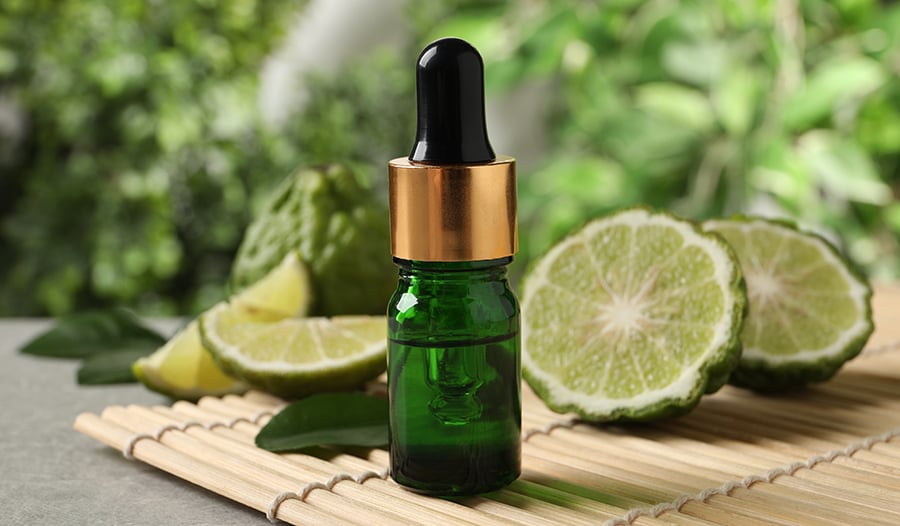Bergamott: Bruk, fordeler og bivirkninger

Har du noen gang lurt på hva sitrusfrukten som gir Earl Grey-teen sin særegne smak består av? Bergamott, en velduftende sitrusfrukt som hovedsakelig dyrkes i Sør-Italia, har skapt bølger i helse- og velværesamfunnet på grunn av sine imponerende mange potensielle fordeler. Denne bemerkelsesverdige frukten har mer å by på enn bare en behagelig aroma, fra å fremme hjertehelsen til å støtte leveren.
Hva er bergamott?
Bergamott (Citrus bergamia) er en liten, aromatisk sitrusfrukt som ligner en krysning mellom sitron og appelsin. Denne frukten kommer opprinnelig fra Calabria-regionen i Italia, og har i århundrer blitt brukt i tradisjonell medisin og aromaterapi. I dag er bergamott tilgjengelig i ulike former, blant annet som eteriske oljer, kosttilskudd og som smaksstoff i te og andre drikker.
En nylig omfattende gjennomgang fremhevet bergamottets unike sammensetning av flavonoider og polyfenoler, som bidrar til dets terapeutiske egenskaper.1 Disse bioaktive forbindelsene har fått stor oppmerksomhet fra forskere over hele verden, noe som har ført til en rekke studier som har undersøkt bergamottets potensielle helsefordeler.
Potensielle helsemessige fordeler med bergamott
Kardiovaskulær helse og kolesterolkontroll
Nyere forskning har vist at bergamott har en betydelig innvirkning på hjerte- og karsystemet, særlig når det gjelder å kontrollere kolesterolnivået. Kliniske studier har vist at tilskudd av bergamott kan redusere totalkolesterolet med 12,3 % til 31,3 % og LDL-kolesterolet med 7,6 % til 40,8 %.1 Fruktens unike sammensetning av flavonoider, inkludert brutieridin og melitidin, ser ut til å spille en avgjørende rolle for disse effektene.5
Leverhelse og metabolske fordeler
Bergamott har vist seg å ha et bemerkelsesverdig potensial når det gjelder å støtte leverens helse, særlig i tilfeller av ikke-alkoholisk fettleversykdom (NAFLD). Studier tyder på at bergamottpolyfenoler kan forbedre leverfunksjonsmarkører og redusere oksidativt stress.6 Forskning har vist at tilskudd av bergamott kan redusere ALAT-nivåene betydelig og forbedre ulike aspekter ved leverens helse.6 Kombinasjonen av bergamott og andre naturlige forbindelser som artisjokkekstrakt har vist lovende resultater når det gjelder å motvirke NAFLD-relaterte komplikasjoner.7
Antioksidanter og betennelsesdempende egenskaper
Fruktens rike polyfenolprofil bidrar til dens sterke antioksidant- og betennelsesdempende effekt.2 Disse forbindelsene virker synergistisk for å bekjempe oksidativt stress og redusere systemisk betennelse, som er nøkkelfaktorer i ulike metabolske forstyrrelser.3 Forskning har vist at bergamottets antioksidantegenskaper kan bidra til å beskytte cellene mot skader og støtte den generelle cellehelsen.8
Regulering av blodsukkeret
Studier har indikert at bergamott kan ha gunstige effekter på blodsukkernivået.4 Denne egenskapen, kombinert med de lipidsenkende effektene, gjør bergamott spesielt interessant for personer med stoffskiftesykdommer.
Bergamot Bivirkninger og sikkerhetshensyn
Selv om bergamott generelt tolereres godt, er det viktig å være oppmerksom på potensielle bivirkninger og sikkerhetshensyn. Den vanligste bivirkningen ved lokal bruk er fotosensitivitet. Dette betyr at huden din kan bli mer følsom for sollys, noe som kan føre til solbrenthet eller hudirritasjon.
Noen personer kan oppleve milde fordøyelsesproblemer, som halsbrann, når de tar bergamotttilskudd gjennom munnen. Som med alle andre kosttilskudd er det viktig å følge anbefalte doser og rådføre seg med helsepersonell før man begynner å bruke det.
Hvordan bruke bergamott
Den riktige bruken av bergamott avhenger av dens form:
- Eterisk bergamottolje: Kan brukes i aromaterapidiffusorer eller fortynnet med en bærerolje for lokal påføring. Påfør aldri ufortynnet eterisk olje direkte på huden.
- Bergamott kosttilskudd: Følg produsentens anbefalte dosering. De fleste studiene har brukt doser på mellom 500-1500 mg standardisert ekstrakt daglig.
- Bergamotte-te: Te som inneholder bergamott, som Earl Grey, kan nytes hele dagen. Begynn med én kopp, og juster etter dine preferanser og toleranse.
Velge bergamottprodukter
Når du kjøper bergamottprodukter, bør du vurdere disse faktorene:
- Kvalitet: Se etter produkter fra anerkjente produsenter som tilbyr tredjeparts testresultater og har gode anmeldelser. Ekstrakter som er utviklet for å være mer biotilgjengelige, kan bidra til at mer av ingrediensen kommer inn i kroppen din.
- Ytterligere ingredienser: Noen studier viser at bergamott-tilskudd kan fungere bedre for leverhelsen når de kombineres med andre ingredienser som artisjokkekstrakt.8 Vurder et kombinasjonsprodukt hvis du ønsker å oppnå noe spesifikt.
- Form: Velg den formen som passer best for dine behov (eterisk olje, kosttilskudd eller te).
- Standardisering: Når det gjelder kosttilskudd, bør du se etter produkter som er standardisert for å inneholde spesifikke nivåer av aktive stoffer. Sjekk om mengdene stemmer overens med anbefalte doser.
- Pris: Kvalitetsprodukter kan koste mer, men vær på vakt mot priser som virker ekstremt lave eller for gode til å være sanne.
Husk at selv om bergamott viser lovende helseeffekter i noen studier, er det ikke en mirakelkur eller behandling for sykdommer. Innlemme det som en del av en sunn livsstil som inkluderer et balansert kosthold, regelmessig mosjon og tilstrekkelig søvn. Kosttilskudd er ikke en erstatning for medisinsk behandling. Snakk alltid med legen din når du vurderer å ta et kosttilskudd som en del av et generelt helseregime. Som med alle andre kosttilskudd kan resultatene variere fra person til person, og konsistens er avgjørende for å oppleve potensielle fordeler.
Bunnlinjen
Bergamott er en lovende naturlig forbindelse med en rekke terapeutiske bruksområder, særlig innen kardiovaskulær helse, metabolsk funksjon og leverstøtte. De veldokumenterte effektene på kolesterolkontroll og ny forskning på leverhelse gjør det til et interessant alternativ for dem som søker naturlige helseløsninger. Som med alle andre kosttilskudd er det imidlertid viktig å bruke bergamottprodukter under passende medisinsk tilsyn og med nøye oppmerksomhet på potensielle bivirkninger og interaksjoner. Forskningen fortsetter å avdekke nye potensielle bruksområder, samtidig som den bekrefter de tradisjonelle bruksområdene til denne allsidige sitrusfrukten.
Referanser:
- Lamiquiz-Moneo, I., Giné-González, J., Alisente, S., Bea, A. M., Pérez-Calahorra, S., Marco-Benedí, V., ... Mateo-Gallego, R. (2019). Effekten av bergamott på lipidprofilen hos mennesker: En systematisk gjennomgang. Kritiske vurderinger i matvitenskap og ernæring, 60(18), 3133-3143. https://doi.org/10.1080/10408398.2019.1677554
- Adorisio, S., Muscari, I., Fierabracci, A., Thi Thuy, T., Marchetti, M. C., Ayroldi, E., & Delfino, D. V. (2023). Biologiske effekter av bergamott og dets potensielle terapeutiske bruk som betennelsesdempende, antioksidant og krefthemmende middel. Farmasøytisk biologi, 61(1), 639-646. https://doi.org/10.1080/13880209.2023.2197010
- Carresi C, Gliozzi M, Musolino V, Scicchitano M, Scarano F, Bosco F, Nucera S, Maiuolo J, Macrì R, Ruga S, et al. Effekten av naturlige antioksidanter i utviklingen av metabolsk syndrom: Fokus på bergamott polyfenolisk fraksjon. Næringsstoffer. 2020; 12(5):1504. https://doi.org/10.3390/nu12051504
- Mollace V, Sacco I, Janda E, et al. Hypolipemisk og hypoglykemisk aktivitet av bergamott-polyfenoler: fra dyremodeller til studier på mennesker. Fitoterapia. 2011;82(3):309-316. https://doi.org/10.1016/j.fitote.2010.10.014
- Nauman MC, Johnson JJ. Klinisk bruk av bergamott (Citrus bergamia) for å redusere høyt kolesterol og markører for hjerte- og karsykdommer. Integrert mat Nutr Metab. 2019 Mar;6(2):10.15761/IFNM.1000249. doi: . 10.15761/IFNM.1000249. Epub 2019 Feb 28. PMID: 31057945; PMCID: PMC6497409.
- Musolino, V., Gliozzi, M., Scarano, F. et al. Polyfenoler fra bergamott forbedrer dyslipidemi og patofysiologiske egenskaper i en musemodell for ikke-alkoholisk fettleversykdom. Sci Rep 10, 2565 (2020). https://doi.org/10.1038/s41598-020-59485-3
- Maiuolo J, Mollace R, Bosco F, Scarano F, Oppedisano F, Nucera S, Ruga S, Guarnieri L, Macri R, Bava I, et al. De fytokjemiske synergistiske egenskapene til kombinasjonen av bergamott polyfenolisk fraksjon og Cynara cardunculus-ekstrakt ved ikke-alkoholisk fettleversykdom. Landbruk. 2023; 13(2):249. https://doi.org/10.3390/agriculture13020249
- Musolino V, Gliozzi M, Bombardelli E, Nucera S, Carresi C, Maiuolo J, Mollace R, Paone S, Bosco F, Scarano F, Scicchitano M, Macrì R, Ruga S, Zito MC, Palma E, Gratteri S, Ragusa M, Volterrani M, Fini M, Mollace V. Den synergistiske effekten av Citrus bergamia- og Cynara cardunculus-ekstrakter på vaskulær betennelse og oksidativt stress ved ikke-alkoholisk fettleversykdom. J Tradit Complement Med. 2020 Feb 8;10(3):268-274. DOI: 10.1016/j.jtcme.2020.02.004. PMID: 32670822; PMCID: PMC7340872.
ANSVARSFRASKRIVELSE:Velværesenteret har ikke til hensikt å gi diagnoser ...
















































































 Innholdsfortegnelse
Innholdsfortegnelse














